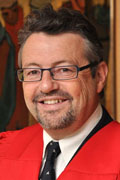 |
| Prof. Iain Benson |
|
Prof. Iain Benson, an Extraordinary Professor in the Department of Constitutional Law and Philosophy of Law at the University of the Free State (UFS), was one of the speakers at the signing of the historic South African Charter of Religious Rights and Freedoms on Thursday, 21 October 2010.
Thursday’s signing of the charter was the culmination of two years’ work of the Continuation Committee responsible for drawing up the document, of which Prof. Benson is a part. All the major religions signed the charter at the ceremony Thursday where Prof. Benson was one of the four speakers, who included the Deputy Chief Justice of South Africa, Justice Moseneke.
The charter, which has already received considerable international and national attention, will now be submitted to the ANC government for negotiations. Indicative of the important role that Prof. Benson played in the process of drawing up the charter is that he has been offered a role as an advisor for the newly created committee responsible for the drafting of the Constitution of the Council of Religious Freedom.
Originally hailing from Canada and currently residing with his family in France, Prof. Benson is an academic with a wealth of experience and expertise in the field of law, especially with regard to right of conscience and religion. His achievements number many, including being a Senior Associate Counsel at one of Canada’s leading law firms, Miller Thompson LLP; and serving on the Founding Board of the Global Centre for Pluralism. Prof. Benson gave his inaugural lecture last week with a lecture entitled Living together with Disagreements and the Limits of the Law.